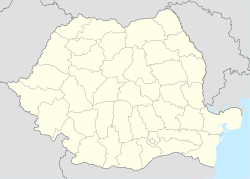It is an earthen fortification located some 3 km north from the village of Herneacova, Timiș County, Romania.[2] The site known locally as Cetate ("Fortress") or Cetatea turcească ("Turkish fortress") consists of a hillock fortified by a system consisting of three moats and two ramparts. The route of one of the ramparts is partially used today as a country road, between Sălciua Nouă and Herneacova.[3] The archeological surveys carried out by Florin Medeleț in 1971 highlighted a fortress of refuge that dominated the valley of the Bencec stream and that functioned at the end of the first Iron Age and the 3rd–4th centuries AD, respectively.[4] The defensive system surrounds an area of about 5 ha.[5]
| Location | Cetate,[1] Herneacova, Timiș, Romania |
|---|---|
| Coordinates | 45°52′41″N 21°29′10″E / 45.878°N 21.486°E |
| Area | 5 ha |
| History | |
| Cultures | Late Hallstatt, La Tène |
| Site notes | |
| Discovered | 1971 |
| Excavation dates | 2003–06 |
| Archaeologists | Florin Medeleț |
| Condition | Ruined |
| Reference no. | TM-I-s-A-06062[1] |
References
edit- ^ a b "Așezarea fortificată de la Herneacova - Cetate". National Archeological Repertory.
- ^ Luca, Sabin Adrian (2006). Descoperiri arheologice din Banatul românesc: repertoriu (PDF). Alba Iulia: Altip. p. 133. ISBN 978-973-7724-84-7.
- ^ Cedică, Valentin; Medeleț, Florin (2002). "Fortificația de pământ de la Herneacova (com. Recaș, jud. Timiș)" (PDF). Patrimonium Banaticum. 1: 85–86.
- ^ Măruia, Liviu; et al. (2011). "Herneacova (oraș Recaș, jud. Timiș)". ArheoGIS. Baza de date a patrimoniului arheologic cuprins în Lista Monumentelor Istorice a județului Timiș. Rezultatele cercetărilor de teren. Cluj-Napoca: BioFlux. pp. 207–214.
- ^ Micle, Dorel; Meglei, Vlad; Hegyi, Alexandru (2016). "Parcul arheologic Herneacova-Cetate: un model de exploatare științifică, turistică și economică în contextul dezvoltării durabile" (PDF). ArheoVest. 4. Szeged: JATEPress: 639–651. ISBN 978-963-315-310-9.
